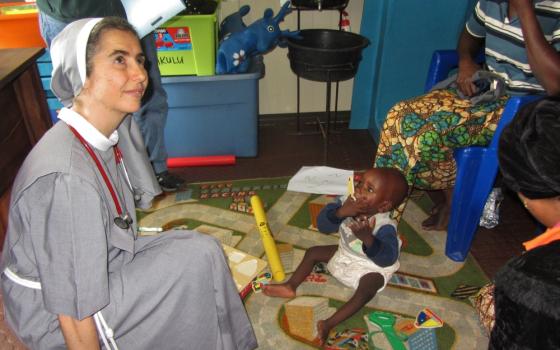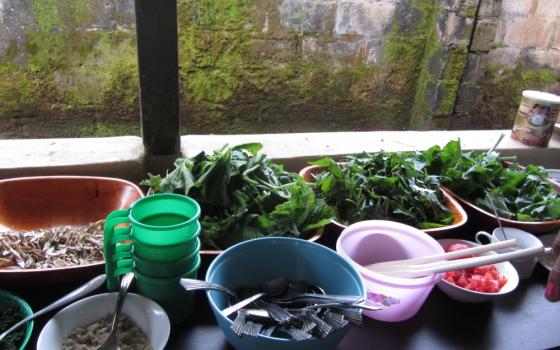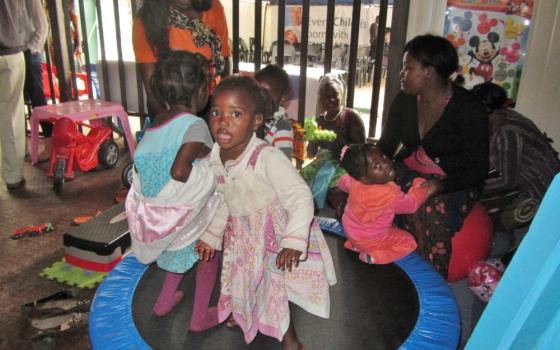This past April, as a board member of the Hilton Foundation Board I had the privilege of visiting early child development projects in Zambia, a special area of funding for the foundation. As a board we had received reports on progress being made by our various projects, but seeing children in person was a special experience. Early childhood development programs are so important in all countries, but even more so in the poorest ones. The U.N. Convention on the Rights of the Child and the Convention on the Rights of Persons with Disabilities state that every child has the right to develop “to the maximum extent possible.” This includes addressing health issues but also the influence of environment. UNICEF studies have shown that good care and development opportunities can potentially reduce future costs of education, medical care and social services.
Because brain development takes place most rapidly during the first three years of a child’s life, attention needs to be placed here. We visited a number of projects where needed protocols and education of parents are being developed and implemented. It was at the Elizabeth Glaser Clinic that I met Sr. Ornella Ciccone. I was surprised and excited to see a sister among the staffand later learned that she is currently the only pediatric neurologist in Zambia. Having this position, you can imagine how busy she is.
Sister was examining a little boy who had difficulty standing, even though he was two years old. (See photo above.) You could see how undeveloped he is. His mother had been counseled in how to help her child gain strength, and this was a follow-up visit.
Nutrition is also an important part of the education, so mothers are taught what kinds of food their children need to develop.
Sister Ornella is a Missionary Franciscan of Assisi. She lives at Kabulonga Cheshire Home in Lusaka, a rehabilitation center for children with disabilities. It is the only one of its kind in Lusaka and cares for about 126 children each year. The care is free to the families so the institution runs primarily on donations. The children, ages 6 to 14 live at the home during the school year and return to their families, if possible, at vacation times. Counseling of the children and also the parents is an important apart of the services provided, because children with disabilities in Zambia are often shunned by their families. They might be kept hidden because neighbors and relatives blame the parents for such children’s conditions.
Sister Ornella helps staff at the home with its outreach program, searching for children who are at risk from impoverished areas of Lusaka and beyond. When the children are found they are examined, and needed surgeries are performed at local hospitals. Therapy, education and “family” are provided at the home. Sister also assists with epilepsy consultations at local hospitals and clinics, and during other days she works at the University Teaching Hospital in Lusaka and at the Elizabeth Glaser Clinic, where she also does consultations with children under 5. She is a member of the Neurology Society of Zambia and in contact with the African Committee of International League Against Epilepsy. She gave a presentation at the 2014 of the African Child Neurology Association conference held in Cape Town, South Africa.
Sister’s professional work as a specialist in pediatric neurology required five years beyond her training as a doctor, and before coming to Zambia, she spent eight years in the Philippines with her community, living on the outskirts of Manila among “squatters” homes. They served in a clinic and opened a center for the street children.
The challenges in Zambia are many because it is one of the poorest countries of Africa. HIV/AIDS continues to be very prevalent, as is malnutrition — both often causes of nervous system damage along with cerebral malaria. Other challenges, besides being alone in her field of medicine, include lack of resources, both for diagnosis and treatment. Families are often in rural areas without access to transportation to bring their children for examinations or diagnosis, which naturally delays any help that can be given.
According to Dr. Jo M. Wilmshust in an article co-published with a number of other medical doctors in 2011, in some areas of Africa, 20 percent of children admitted to district general hospitals have neurological conditions, including acute seizures. Epileptic seizures usually motivate the parents to bring their children to a medical facility. There has been little data collection, especially at the rural health center,s because referrals are sent on to other facilities. Unfortunately, according to the study, there is a general lack of data across the continent that inhibits the ability to lobby for better health care for these children.
It is inspiring to me to see a sister, Sister Ornella, as one of the pioneers of pediatric neurology on the African continent.
[Joyce Meyer, PBVM, is international liaison to women religious outside of the United States for Global Sisters Report.]



